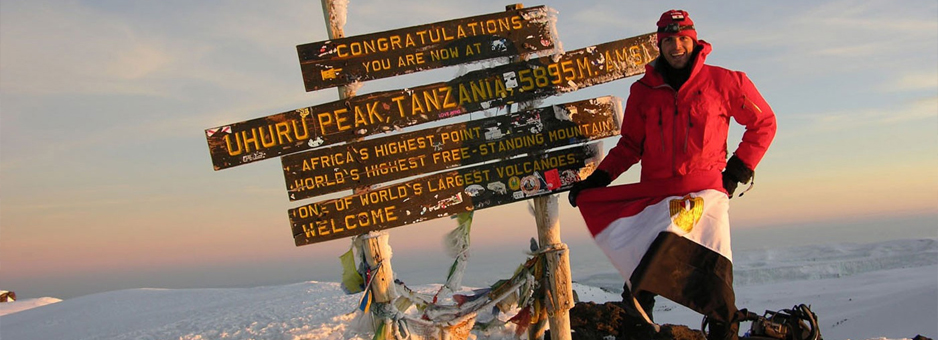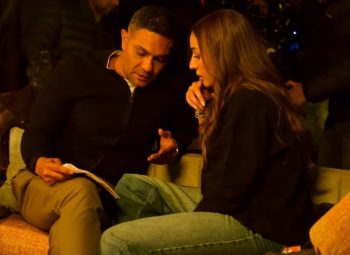What can you say about Omar Samra that hasn’t been said before? Mountaineer, adventurer, entrepreneur, motivational speaker, future astronaut and so much more, Cairo Gossip’s Mahmoud Hussein – himself a mountaineer in the making – sat down with the man himself to speak about his record-breaking achievements, downtime on mountains, Humans of New York, his legacy and more.
First off, congratulations on your Explorer’s Grand Slam – only the 33rd person ever to complete it! How awesome do you feel?
I guess the fact that I’m one of few people adds to the feeling of accomplishment. It’s probably one of the reasons that drew me to this sort of challenge, because very few people have done it. It’s been a very long journey; it technically started 8 years ago, but the dream has been in the making for over 20 years. Now that I’ve done it, though, I don’t quite feel the level of excitement I was expecting. When I finished the North Pole, I felt like “Ok, great – but what now?”
I’m taking some time off, for the next year and a half or so, to focus on work and to prepare for the space trip – just micro-adventures, no long expeditions. I actually have some ideas for something I’m hoping to do in 2017.
Twenty years in the making – how did that journey start?
It all started when I climbed my fist mountain in Switzerland when I was 16 years old. I’d never experienced climbing before or even encountered snow up to that point. It was actually something that happened by coincidence. I was in Switzerland for a summer camp and the climb was an optional activity. I thought I might as well give it a go, because I didn’t know if I’d have this kind of opportunity again. That was the beginning; I fell in love with climbing and with mountains.
What would you consider your most challenging adventure you’ve taken on?
These kinds of expeditions can be challenging for many different reasons. In terms of physical effort and mental exhaustion, I’d say Everest was the most challenging – mostly because we spent 65 days on the mountain. Spending 65 straight days anywhere is challenging, especially because it’s a place that’s difficult to inhabit. But I’ve been in other situations that presented technical challenges. You’re usually putting all your trust in your equipment and your team-mates, but that’s a different kind of test.
The other kind of challenge is the ability to go on to do whatever it is that you want to do despite your personal circumstances. But it teaches you that; it teaches you how to control your mind, to drown the voices telling you that you’re not good enough, or to give up.
Your mind must be a library of anecdotal memories – does any particular moment stand out as memorable, remarkable or just plain weird?
I don’t know if it’s the weirdest thing, but the first thing that comes to mind is Burma. I went in 2002 when virtually no one was going there. I remember being in the jungle somewhere and when we were hiking, we had to pass by some local tribes. I remember the children in the tribes were basically crying when they saw us – it was the first time they’d seen outsiders. It must have been terrifying for them, but it was a surreal experience for us, too.
Of the many countries you’ve travelled to, which ones number amongst your favourites?
I’ve been to Nepal more than ten times and it easily tops my list of favourite places because of its mountains. But then Peru is a place which is very close to my heart, too. I think I’ve been there 6 or 7 times, but if it was a little closer, I’d go more often. It’s a country with amazing food and I love Inca history. It’s a very special place.
Burma (Facebook)
How do you keep yourself entertained when on your longer trips?
I mainly read. I used to read a lot on the tube when I was a banker in the UK. I’d finish a book every two weeks or so, but when I moved back to Egypt, I never got that kind of alone time, so I would take advantage of the downtime during expeditions and read. On Everest alone, I read around 7 books. I use my Kindle these days, but now I’m actually getting back to using books again – it’s just more enjoyable.
What kind of books? Are they a way to escape or a way to keep your mind focused on the task at hand?
As far as books are concerned, there are certain topics that I like to read about. I like to read stories of survival; stories about people who have defied all odds to achieve their goals. There was a period where I read a lot of mountaineering literature and one book in particular called K2: The Savage Mountain has stuck with me. It’s about the 1958 American expedition to the summit of K2 [the world’s second tallest mountain after Everest]. It’s a tragic story. The expedition ran into some difficulties and one of the team member, who fell ill and became a burden, sacrificed himself to save the rest of the team – he cut his rope.





